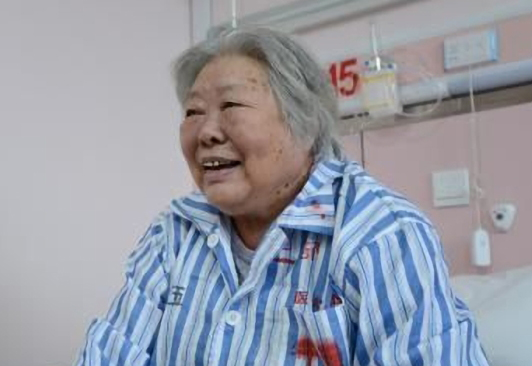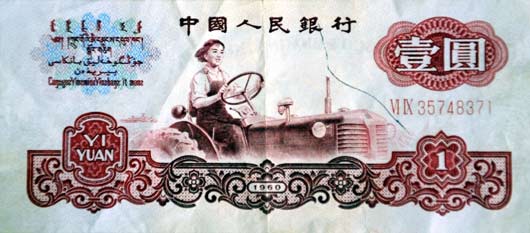

|
 |
|
Liang Jun, 85, China's first female tractor driver, recovers at the Second Affiliated Hospital of Harbin Medical University after she was sent to the hospital on Oct 23 due to acute heart failure and serious asthma. Provided to China Daily |
|
 |
|
?A one yuan banknote issued in 1962, the third series of renminbi bills. |
A female tractor driver, described as the inspiration behind the image on the one yuan banknote first issued in 1962, insists she was the subject despite the note's designer claiming it was not based on any living person.
Liang Jun, 85, was put in the spotlight after she was sent to the Second Affiliated Hospital of Harbin Medical University on Oct 23 due to acute heart failure and serious asthma.
"They told me that I was the subject, and I really felt greatly honored. But I think the woman represents all of the working women in China," Liang told China Daily on Thursday.
But Hou Yimin, one of the designers of the third series of renminbi banknotes in the mid-1950s, told the Beijing Morning Post that the portrait was painted only according to his imagination.
"I know Liang Jun was the first female tractor driver, and I felt very happy that she liked the third series of renminbi banknotes. But I have to say that she was not the prototype. The tractor on the note was different from those she drove," Hou told the newspaper.
Liang's health has improved after treatment.
"When she was sent here, she was in a critical condition and had difficulty breathing because of her old age and the bad weather in Harbin last week," said Ma Lan, her physician.
The medical examination report showed she was being plagued by various illnesses suffered by the elderly, including diabetes mellitus, serious high blood pressure, serious heart disease and asthma.
Medical experts from different departments gathered immediately to give her emergency treatment and a consultation. The targeted therapy and careful nursing had a big effect.
"Liang's condition gradually stabilized and her mental state is good. She enjoyed telling us her old stories, and we were all curious about her legendary experience," said Liu Dandan, one of the nurses who cared for Liang.
"I have long known that China's first female tractor driver, Liang Jun, was born in Heilongjiang and still lives there. When I met her in the hospital and had the chance to take care of her, I felt great honor," said Liu. "She set a good example for all working women in China."
Ma added: "Besides medical treatment, it is also important to give the elderly psychological care. Therefore, we encouraged her to have more communication with others. Listening to her story and updating her on her medical condition were good for her recovery."
Liang said: "The first time I saw a woman driving a tractor was in a Soviet film I saw in 1947. It was then that I made up my mind to become a tractor driver."
At that time, she was only 17 years old and a student at Mengya Normal School in Dejun county — now a city named Wudalianchi — in Heilongjiang. In those days, it was inconceivable that women could drive tractors.
In February 1948, a tractor driver training class was held in Bei'an, a county 48 kilometers from Dejun. Liang signed up as soon as she received news her school could send three students to the class.
"At first, the teachers didn't agree that I could be sent there, but, due to my good performance and my persistence, the teachers decided to give me an opportunity," Liang said.
When she arrived at Bei'an, she discovered she was the only female student in the class because people believed driving a tractor was man's work.
"I told myself that I couldn't do worse than any man in the class. During three months of study, I mastered the mechanical principles of driving a tractor as well as the men did." Liang said.
From then on, Liang began to engage in cultivating wasteland in Heilongjiang.
In September 1950, when she was 20 years old, Liang was awarded the title of National Model Worker and met Chairman Mao Zedong in Beijing.
In 1951, she got the chance to study in Beijing.
After two years of systematic learning she greatly increased her knowledge of agricultural machinery. She turned down the opportunity to stay in the capital and returned to her hometown with a wealth of knowledge.
"Heilongjiang is my home and could provide me with a lot of space to drive. I have had an affinity with tractors all my life. If I were 30 years younger, I would still drive tractors on my lovely black soil." said Liang.
Over the decades, five series of renminbi banknotes have been issued.
The designers have used various design elements, such as portraits including leaders and ethnic groups as well as workers.
There are also famous scenic spots of China on the notes, such as the Potala Palace in Tibet, the West Lake in Hangzhou and Taishan Mountain in Shandong province.